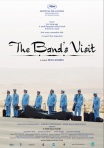 You Don’t Mess with the Zohan (2008) is a Judd Apatow / Adam Sandler film: as Roger Ebert so beautifully put it, “a mighty hymn of and to vulgarity.” It is a slapstick romp about a crack Mossad operative whose secret wish is to “stop the killing” and become a hairdresser in New York. Once there, he finds himself an outsider along with many Palestinians. They chase one another, in Keystone Cop fashion (but with more penis and hummus jokes) until the sets are destroyed and everyone is exhausted. I think that about sums it up.
You Don’t Mess with the Zohan (2008) is a Judd Apatow / Adam Sandler film: as Roger Ebert so beautifully put it, “a mighty hymn of and to vulgarity.” It is a slapstick romp about a crack Mossad operative whose secret wish is to “stop the killing” and become a hairdresser in New York. Once there, he finds himself an outsider along with many Palestinians. They chase one another, in Keystone Cop fashion (but with more penis and hummus jokes) until the sets are destroyed and everyone is exhausted. I think that about sums it up.
Commentary
I had to think a while about my comments on this film, because I hope that Sandler et al meant well. There are many jokes making fun of Israelis, some of it pretty rough humor, and to give Sandler the benefit of the doubt, I hope that he thought that those jokes were in balance with the jokes at the expense of the Arab characters. After all, the Zohan’s love interest is a Palestinian woman!
But there is no getting past the fact that while the film plays with Israeli stereotypes (tough guy, the accent, the attitude, the Sabra heart of sweetness) it trades on a nastier stereotype of Arabs and Palestinians: the lust for Jewish blood and mindless hatred. The humor about the Zohan springs from the tension between his tough-guy Mossad persona and his true hairdresser lover-boy identity. The humor about the Arabs in this film does not come from any such tension: the men are mostly Wile E. Coyote to Zohan’s RoadRunner, one-note idiots who repeatedly court disaster in hot comic pursuit of their quarry. The more benign Palestinian male characters are merely dim. This is racist stereotyping at its worst, because it is disguised as “all in good fun” while it sends the same old hateful messages. Worse yet, it is aimed specifically at young men.
For those who are saying, “Whoa! Don’t you love Israel?” all I can say is, I dislike this film because I do love Israel. I am a deeply committed Zionist. I lived in Israel in 2002-3, during the Second Intifada. I dislike this film because I think that racism like this hurts Israel, and damages the chances for peace, because it tells young American men that Palestinian men are subhuman. I can point to Israeli films that take similar or even touchier subject matter and do so much better with it: for example, watch The Band’s Visit. It’s a wonderful, funny film that gets its comedy from the humanity of everyone in it.
For a contrast to a broad, sometimes vulgar comedy that tackles similar subject matter with much better results, take a look at The Infidel. Everyone in that movie is a complicated human being, with complicated motives and dreams that lead them into a comical collision. We all laugh together at the human condition: much, much better.
As for the way women are pictured in this film, I will just say: feh. I am very tired of Jewish filmmakers failing to work out their mommy issues — or going for the cheap laugh, which is worse — by dumping on women. Sandler and Apatow, you can do better!


 Live and Become
Live and Become The Mad Adventures of Rabbi Jacob
The Mad Adventures of Rabbi Jacob Exodus
Exodus  In
In